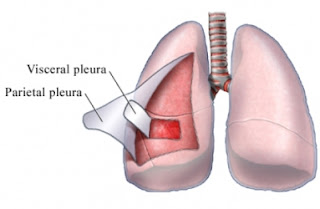Chest Pain: Is It Lungs?
Chest pain arising from lungs/respiratory tract usually will be accompanied by symptoms such as shortness of breath & cough.
Lungs infection (pneumonia/lung abscess)
In the case of lung infection, chest pain is usually not the main complaint. Initially fever and cough are the likely problems. When the infection gets worse, shortness of breath may occur as more lung volume is involved.
Pneumonia: common lungs pathology but chest pain not common
Pneumothorax
This is a condition where air gets into the pleural cavity (space between the outer lungs and inner chest wall), causing the lung to collapse. This can occur during trauma/injury to the chest or spontaneously.
In pneumothorax, shortness of breath is usually the first and most prominent symptom. In trauma case, of course the sufferer will have obvious chest injury and pain. In spontaneous case (without trauma), chest pain may be felt which may be worse when breathing in.
Pneumothorax is potentially fatal and sufferer should get immediate medical attention.
Pleuritis
Pleuritis is inflammation of the pleural which line the lungs and inner chest wall. Typically the pain is felt more when taking a deep breath in, as the pleural rub against the chest wall more during a deep breath.
Pathology involving pleural will cause pleuritic pain (pain aggravated by breathing)
Lung cancer
Depends on the size and site of the cancer, lung cancer can give rise to chest pain but not very common. Other associated symptoms are cough, cough out blood, shortness of breath, loss of weight/appetite.
Pulmonary embolism
Pulmonary embolism occurs when a blood clot from the veins of lower part of body travel to the lungs and block the blood supply to a portion of the lung. This can cause sudden sharp chest pain, accompanied by shortness of breath. If the clot is large, it is potentially life-threatening.
Asthma
Obviously in asthma, sufferer will have shortness of breath and wheezing, and they may feel tightness in the chest as well.
Click here for clues on how to differentiate chest pain.


No comments:
Post a Comment